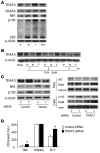NF-kappaB p100 limits TNF-induced bone resorption in mice by a TRAF3-dependent mechanism
- PMID: 19770515
- PMCID: PMC2752069
- DOI: 10.1172/JCI38716
NF-kappaB p100 limits TNF-induced bone resorption in mice by a TRAF3-dependent mechanism
Abstract
TNF and RANKL mediate bone destruction in common bone diseases, including osteoarthritis and RA. They activate NF-kappaB canonical signaling directly in osteoclast precursors (OCPs) to induce osteoclast formation in vitro. However, unlike RANKL, TNF does not activate the alternative NF-kappaB pathway efficiently to process the IkappaB protein NF-kappaB p100 to NF-kappaB p52, nor does it appear to induce osteoclast formation in vivo in the absence of RANKL. Here, we show that TNF limits RANKL- and TNF-induced osteoclast formation in vitro and in vivo by increasing NF-kappaB p100 protein accumulation in OCPs. In contrast, TNF induced robust osteoclast formation in vivo in mice lacking RANKL or RANK when the mice also lacked NF-kappaB p100, and TNF-Tg mice lacking NF-kappaB p100 had more severe joint erosion and inflammation than did TNF-Tg littermates. TNF, but not RANKL, increased OCP expression of TNF receptor-associated factor 3 (TRAF3), an adapter protein that regulates NF-kappaB p100 levels in B cells. TRAF3 siRNA prevented TNF-induced NF-kappaB p100 accumulation and inhibition of osteoclastogenesis. These findings suggest that upregulation of TRAF3 or NF-kappaB p100 expression or inhibition of NF-kappaB p100 degradation in OCPs could limit bone destruction and inflammation-induced bone loss in common bone diseases.
Figures






Comment in
-
NF-kappaB2 (p100) limits TNF-alpha-induced osteoclastogenesis.J Clin Invest. 2009 Oct;119(10):2879-81. doi: 10.1172/JCI40629. Epub 2009 Sep 21. J Clin Invest. 2009. PMID: 19770519 Free PMC article.
References
Publication types
MeSH terms
Substances
Grants and funding
LinkOut - more resources
Full Text Sources
Other Literature Sources
Molecular Biology Databases
Research Materials
Miscellaneous

